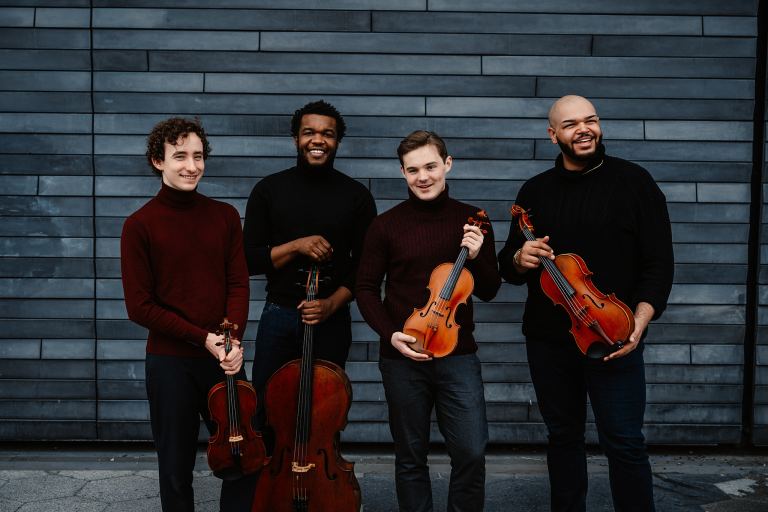A Recital by the Isidore Quartet

Please Note:
Tickets will go on sale to the public April 16. A $3 ticket fee will apply to all single tickets.
30 minute hold in cart
HAYDN: String Quartet in B-flat major, Hob. III/78, op. 76, no. 4, “Sunrise”
SCHULHOFF: Five Pieces for String Quartet
--
DVOŘÁK: String Quartet No. 13 in G major, B. 192, op. 106
Winners of a 2023 Avery Fisher Career Grant, and the 14th Banff International String Quartet Competition in 2022, the New York City-based Isidore String Quartet was formed in 2019 with a vision to revisit, rediscover, and reinvigorate the repertory. The quartet is heavily influenced by the Juilliard String Quartet and the idea of 'approaching the established as if it were brand new, and the new as if it were firmly established.'
Their program begins with Haydn’s imitation of the rising sun in an ascending theme for the violin. Here is the composer at the top of his string quartet game, with the entire opus 76 "six pack" showing a new level of virtuosity and innovation.
Edwin Schulhoff was born in Prague in 1894 and upon Dvorak's recommendation, began studies at the Prague Conservatory at the age of ten. After serving in the first world war, he created a unique musical language incorporating a wide range of styles including German Expressionism, American Ragtime, South American dance, and more. His leftist politics found their way into his creative life, including a cantata setting of the Communist Manifesto. When the Germans invaded Czechoslovakia, Schulhoff was arrested and deported to a concentration camp where he died of tuberculosis at the age of 48. He composed the Five Pieces for String Quartet in 1923 and dedicated them to Darius Milhaud. The pieces make up a dance suite in the Baroque style, but with modern rhythms and dissonances. They reflect Schulhoff's tenet that "Music should first and foremost produce physical pleasures, yes, even ecstasies. Music is never philosophy, it arises from an ecstatic condition, finding its expression through rhythmical movement. "
The time that Dvorak spent in the United States beginning in 1891 was a mixed bag. He was able to conduct his music with top notch orchestras in New York and Chicago, and to work with some talented students in his teaching position. On the other hand, he was deeply homesick for his native Bohemia. On the score of his G major quartet, he wrote, "the first composition after my second return from America." His great relief to be home may account for the work's warm atmosphere, and also for the strain of melancholy you'll hear in the slow movement. Here is Dvorak at his finest, displaying a mature mastery of form that gives the work cohesiveness, and an abundance of melodies which at times evoke the folk music of his homeland.
Discover a gifted young ensemble named for their mentor, Juilliard Quartet violinist Isidore Cohen (and for the Greek monk Isidore who concocted the world's first vodka)!